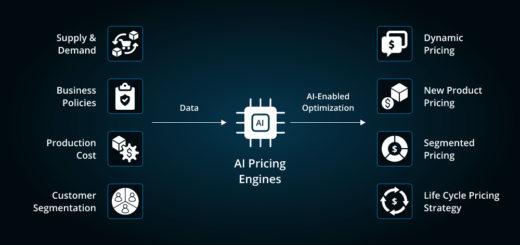AI’s Expanding Role in Business Growth and Decision-Making

Businesses have always relied on data, experience, and intuition to drive growth. The ability to interpret market trends, optimize operations, and predict future demands has traditionally been a human-led effort, with executives, analysts, and strategists making decisions based on historical data and industry insights. However, artificial intelligence (AI) is now reshaping this entire approach, offering an unprecedented level of precision, speed, and predictive accuracy.
The question is no longer whether AI should be used in business strategy, but how extensively it should be integrated. Companies that leverage AI are not just automating processes—they are redefining decision-making models, improving efficiency, and uncovering opportunities that were previously invisible.
This article explores how AI is driving business transformation, enhancing market strategies, and optimizing decision-making at every level.
AI as a Core Component of Business Growth
The modern business landscape is increasingly data-driven, and AI is at the heart of this shift. Unlike traditional data analysis tools, which primarily summarize past trends, AI goes further by:
- Predicting future market behavior, enabling companies to stay ahead of demand shifts.
- Optimizing workflows and operations, reducing inefficiencies that impact revenue.
- Enhancing customer engagement, by personalizing experiences and automating support.
AI’s ability to process large-scale, complex data sets in real time allows businesses to make faster and more informed decisions—a critical advantage in today’s rapidly evolving economy.
AI Applications Reshaping Business Strategy
AI is influencing nearly every aspect of business, from customer engagement to financial planning. Some of the most transformative applications include:
1. AI in Market and Consumer Analysis
Understanding consumer behavior has always been central to business success. AI-driven analytics are enabling companies to predict purchasing trends, identify shifting consumer preferences, and personalize offerings at an unprecedented scale.
- AI-powered sentiment analysis monitors social media and customer feedback to track brand perception.
- Predictive analytics forecasts market demand, helping businesses adjust production and inventory.
- AI-driven recommendation engines personalize product suggestions, increasing sales and customer loyalty.
By leveraging AI, businesses can anticipate changes before they happen, allowing them to stay ahead of competitors.
2. AI in Supply Chain and Logistics Optimization
The complexity of modern supply chains requires real-time monitoring and adaptability. AI is revolutionizing logistics by:
- Optimizing inventory management, ensuring stock levels align with real demand.
- Predicting potential disruptions, from weather patterns to geopolitical shifts, minimizing risks.
- Enhancing route efficiency for shipping and delivery, reducing costs and improving speed.
These capabilities increase resilience and agility, helping businesses maintain seamless operations even in volatile conditions.
3. AI-Powered Business Decision Support
AI is not just assisting with operational improvements—it is also transforming executive-level decision-making. Advanced AI models are being used to:
- Analyze financial data to recommend investment strategies and optimize budget allocations.
- Assess business risks in real-time, identifying financial vulnerabilities and market uncertainties.
- Automate reporting and data visualization, giving leaders clear, actionable insights without manual processing.
With AI-driven insights, decision-makers can make better choices, faster, improving overall business performance.
4. AI in Sales and Customer Engagement
- AI chatbots and virtual assistants provide 24/7 customer support, handling inquiries with human-like interactions.
- Automated CRM systems analyze customer data, suggesting the best times and methods to engage potential clients.
- AI-powered dynamic pricing tools adjust product prices in real-time based on demand, competitor pricing, and economic conditions.
By optimizing sales processes and customer interactions, AI helps businesses increase conversion rates and build stronger customer relationships.
Challenges of Implementing AI in Business
Despite its advantages, integrating AI into business processes comes with challenges:
1. Data Privacy and Security Risks
- AI systems rely on large volumes of data, raising concerns about privacy regulations and data security.
- Businesses must comply with GDPR, CCPA, and other global privacy standards to ensure ethical AI usage.
2. AI Bias and Ethical Considerations
- AI models can unintentionally reflect and amplify biases in their training data, leading to unfair outcomes.
- Companies must prioritize ethical AI development by implementing transparency and bias-detection frameworks.
3. Workforce Transition and Adaptation
- The rise of AI in decision-making may create concerns about job displacement and changing roles within companies.
- Businesses need to upskill employees, helping them work alongside AI rather than seeing it as a replacement.
Overcoming these challenges requires thoughtful implementation strategies, ensuring AI enhances business processes without unintended consequences.
The Future of AI in Business
Looking ahead, AI will continue to evolve, introducing more sophisticated and autonomous systems. Some key trends shaping AI-driven business transformation include:
- AI-powered autonomous decision-making: AI will move beyond recommendations to executing business decisions independently in certain contexts.
- AI in sustainability and corporate responsibility: AI will help businesses reduce carbon footprints, optimize resource usage, and meet ESG (Environmental, Social, and Governance) goals.
- Advanced AI-human collaboration tools: AI will assist executives in brainstorming and strategic planning, providing a more interactive role in shaping business direction.
As these advancements unfold, businesses that embrace AI-driven strategies will gain a competitive advantage in an increasingly data-centric world.
Final Thoughts: A New Era of AI-Driven Business Strategy
AI is no longer an experimental technology—it is a fundamental driver of business innovation and competitive strategy. Companies that integrate AI not just for automation but for intelligent decision-making will find themselves at the forefront of their industries.
The future of business will be shaped by organizations that leverage AI to enhance customer experience, optimize operations, and improve decision-making. However, success in AI adoption will depend on ethical implementation, employee adaptation, and a clear strategic vision.
For businesses, the message is clear: AI is not just an option—it is a necessity for sustainable growth and success in the modern economy.




